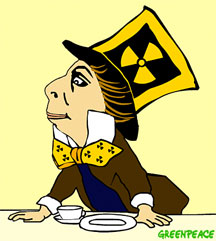
I admire Trita Parsi, president of the National Iranian American Council (NIAC), for his tireless effort to promote a nonviolent resolution of US/Israel-Iran conflict. But solution offered in his recent joint article at IHT (and reprinted at this site), is at best temporary and does not address the root cause of the current global divide.
It is clear that the big powers, the permanent members of UN security council, have violated the terms of NPT by ignoring many of its provisions, including Article VI:
Each of the Parties to the Treaty undertakes to pursue negotiations in good faith on effective measures relating to cessation of the nuclear arms race at an early date and to nuclear disarmament, and on a treaty on general and complete disarmament under strict and effective international control.
The current framework of Non-Proliferation Treaty (NPT) is almost non-performing. It may not be dead, but it is non-functional. This, as many other totally unpleasant outcomes, is another by-product of the Iraq war. In “post Iraq” world, an overwhelmingly majority of nations learned that the Bush administration invaded Iraq not because the administration “thought” Sadaam had weapons of mass destruction; it invaded Iraq because the administration “knew” Sadaam didn’t have weapons of mass destruction. In this regard we must recognize the two years UN inspection of Iraq and destruction of its weapons as part of military strategy of the United States.
The lack of effective international arrangement for control of new and deadlier military nuclear technologies allows countries who constantly use “language of force” to increase and advance their nuclear arsenals. At the same time, these countries use the excuse of preventing the proliferation of nuclear weapons to demonize nuclear activities of other nations and promise to take military action, if necessary, to eliminate sources of “mushroom cloud” and “existential threat”. The rest of the world response to this theatric is somehow reflected in a resolution currently being circulated among members of the Non-Aligned Movement (NAM), consisting of almost 118 countries (including India and Pakistan). The resolution partially reads:
“The rich and powerful countries continue to exercise an inordinate influence in determining the nature and direction of international relations, including economic and trade relations, as well as rules governing these relations, many of which are at the expense of developing countries”. NAM countries oppose “unilaterally imposed measures by certain states … the use and threat of use of force, and pressure and coercive measures as a means to achieving their national policy objectives”.
Is nuclear proliferation the only threat to the peace and stability of the world? Unfortunately not!
Currently no country in the world can match the sophistication and power of United States “conventional” weapons. Russians, fearful of losing control of their country following Mikhail Khodorkovsky and Yukos affair, are progressively devoting larger part of their newfound wealth from oil and gas revenue to modernizing their military. Their target is to reach some degree of conventional military parity with the United States in about 10 years. The only other country with an outside chance is China. But China could achieve parity in about 20 to 25 years. No other country in the world has a chance ever to reach a level of “conventional” military fire power similar to the United States and its allies.
The disturbing reality of “post Iraq” world is that the most cost-effective military strategy for countries faced with threat from nations with superior conventional military power (and willingness to use it) is for them to go “nuclear”. From back of the envelope estimates to computationally more complex economic analysis point to the fact that development of a full fledged nuclear industry for generation of energy and nuclear deterrent devices are the least costly approach to achieving “security through strength”1.
The A-bomb has become the poor man’s equalizer. No wonder George P. Shultz, William J. Perry, Henry A. Kissinger and Sam Nunn in an article “A World Free of Nuclear Weapons” published in the Wall Street Journal, January 4, 2007, advocate a global “nuclear disarmament”!
We in the peace movement must distinguish ourselves from likes of Shultz, Perry, and Kissinger. We must push for both nuclear and conventional disarmament. In “post Iraq” word, a word characterized by rape of Geneva Convention and total disregard for the United Nations Charter, smaller nations are not going to trust non-proliferation and rhetoric of nuclear disarmament. We must advocate “total disarmament”. NPT was adopted 40 years ago. Interestingly enough Article VI of the treaty also calls for general and complete disarmament under strict and effective international control.
ABOUT
Shapoor Vali teaches Economics at Fordham University in New York. He is a member of Princeton chapter of Coalition for Peace Action.






